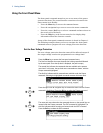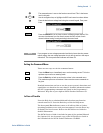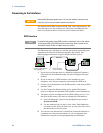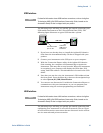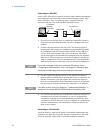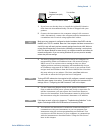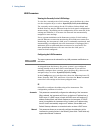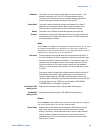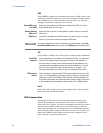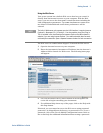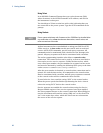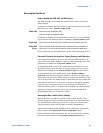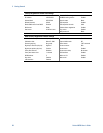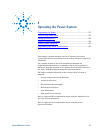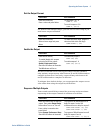
3 Getting Started
46 Series N6700 User’s Guide
DNS
Select DNS to configure the Domain Name System (DNS) setup of the
instrument. DNS is an internet service that translates domain names
into IP addresses. It is also needed for the instrument to find and
display its hostname assigned by the network.
Obtain DNS server
from DHCP
Select this item to obtain the DNS server address from DHCP. You must
have enabled DHCP in the IP menu.
Use the following
DNS server
Select this item if you are not using DHCP or need to connect to a specific
DNS server.
DNS Server This value is the address of the DNS server. It is used if you are not using
DHCP or if you need to connect to a specific DNS server.
NOTE
For improved performance when connected to an isolated subnet, select Use
the following DNS server. However, leave the DNS server address field blank.
TCP
Select TCP to configure the TCP keepalive settings of the instrument.
Enable TCP
Keepalive
Check the Enable box to enable the TCP keepalive function. The instrument
uses the TCP keepalive timer to determine if a client is still reachable. If
there has been no activity on the connection after the specified time, the
instrument will send keepalive probes to the client to determine if it is still
alive. If not, the connection will be marked as down or "dropped." The
instrument will release any resources that were allocated to that client.
TCP keepalive
timeout
This is the delay in seconds before TCP keepalive probes will be sent to the
client. It is recommended that the largest value be used that still meets the
application's need for unreachable client detection. Smaller keepalive time-
out values will generate more keepalive probes (network traffic), using more
of the available network bandwidth. Allowed values: 720 - 99999 seconds.
Reset
Resets the LAN settings to the factory-shipped state. These settings
are listed at the end of this chapter.
LAN Communication
The Agilent IO Libraries Suite along with instrument drivers for
specific programming environments can be used to communicate
with your power system. You can also communicate with your power
system using its built-in Web server, the Telnet utility, or sockets.
These latter methods are a convenient way to communicate with the
power system without using I/O libraries or drivers. In all cases, you
must first establish a LAN connection from your computer to the
power system as previously discussed.



